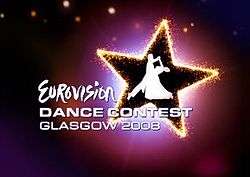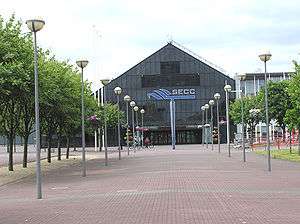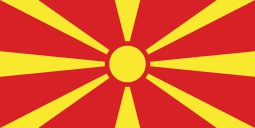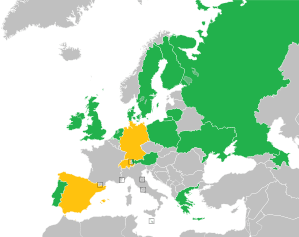Eurovision Dance Contest 2008
The Eurovision Dance Contest 2008 was the second edition of the Eurovision Dance Contest and was held in Glasgow, Scotland, hosted by the BBC on 6 September.[4] The presenters were, as in the previous edition, Graham Norton and Claudia Winkleman. The contest took place at the Scottish Exhibition and Conference Centre.[5]
| Eurovision Dance Contest 2008 | |
|---|---|
 | |
| Dates | |
| Final | 6 September 2008 |
| Host | |
| Venue | SECC, Glasgow, Scotland, United Kingdom |
| Presenter(s) | |
| Directed by | Nikki Parsons |
| Executive supervisor | Tal Barnea |
| Executive producer | Alan Tyler |
| Host broadcaster | BBC Scotland (BBC) |
| Opening act | Red Hot Chilli Pipers playing a Scottish-flavoured medley of known songs, with all couples presented on stage (in order of performance) followed by a group dance routine[1] |
| Interval act | Lesley Garrett and Carousel cast, performing a medley of "June Is Busting Out All Over" and "You'll Never Walk Alone" accompanied by the City of Glasgow Chorus[2][3] |
| Participants | |
| Number of entries | 14 |
| Debuting countries | |
| Returning countries | None |
| Non-returning countries | |
Participation map
| |
| Vote | |
| Voting system | Each country awards 1–8, 10, and 12 points to their 10 favourite acts, plus additional panel of experts awards maximum of 48 points to their favourites.[3] |
| Nul points | None |
| Winning dancers | Edyta Herbuś and Marcin Mroczek |
The winners of contest were Edyta Herbuś and Marcin Mroczek of Poland who achieved a score of 154 points. 2nd place went to Russia, 3rd place to Ukraine, 4th place to Lithuania and 5th place to Azerbaijan who were participating for the first time.
In a change to the rules, professional couples were no longer eligible to enter the contest. At least one dancer from each couple had to be a local celebrity, not professionally trained to dance.[3] A further change was that each couple only performed once. In 2007 each couple performed a ballroom or Latin routine followed by a freestyle dance incorporating national flavour; in the 2008 contest, couples only performed the latter.[3] In 2008 a panel of experts was introduced with an approximate weight of 23% of the total outcome and the rest 77% determined through televoting. The highest possible points from the jury were 48 while the televoting cast a maximum of 156 points.[3]
Location

The Scottish Exhibition and Conference Centre (SECC) is Scotland's largest exhibition centre, located in the district of Finnieston on the north bank of the River Clyde, Glasgow. The venue's holding company SEC Limited, is 91% owned by Glasgow City Council and 9% owned by private investors. It is probably best known for hosting concerts, particularly in Hall 4 and Hall 3.
Since the opening of the original buildings in 1985, the complex has undergone two major expansions; the first being the Clyde Auditorium in 1997, and then the SSE Hydro Arena in 2013.
The host city and venue was announced by the BBC on 7 July 2008.[5]
Participants
According to the 2007 rules Section 2.2[6] on the official website, all entrants in the Eurovision Dance Contest 2007 agreed to take part in 2008 when signing up for the first contest. However, Switzerland and Germany announced their withdrawals from 2008 edition of the contest due to low ratings and poor results in 2007.[3]
The running order was announced on 8 August.[7] Due to a scheduling clash with the FIFA World Cup 2010 preliminaries, the Spanish broadcaster announced its withdrawal on 20 August, just days before the contest took place. In July they held a national selection show Quiero Bailar and named singer Rosa López and dancer Nieto as their representatives in the contest. According to the draw they were supposed to be 15th couple to perform.[8]
As the number of dances was reduced, with each couple performing once instead of twice, new countries were allowed to enter the competition, but the only new country to enter the contest was Azerbaijan.[3]
Controversy
Azerbaijan and Greece announced professional dance couples as their representatives at the Eurovision Dance Contest 2008. According to the regulations of the contest,[6] professional couples were not allowed to take part in the competition. The EBU specified that the couple had to be composed of one professional (defined as a dancer who earns his or her living through dance and dance-related activities), and one non-professional known in a field other than dance. The non-professional was not required to be a celebrity, as long as he or she was known in his field, and it was also not a requirement that the non-professional had no dance experience. Since the representatives for Azerbaijan and Greece both consisted of two professional dancers, however, it is not clear why their entries were considered valid.
Participating countries
| Draw | Country | Competing dancers | Dance styles | Rank | Points |
|---|---|---|---|---|---|
| 01 | Danny Saucedo and Jeanette Carlsson[9] | Cha-Cha | 12 | 38 | |
| 02 | Dorian Steidl and Nicole Kuntner[10] | Slowfox/Jive/Hip-Hop | 13 | 29 | |
| 03 | Patrick Spiegelberg and Katja Svensson[11] | Samba/Tango/Paso Doble/Jazz Dance | 6 | 102 | |
| 04 | Eldar Dzhafarov and Anna Sazhina[12] | Paso Doble/Rumba/Tango/Azeri Folk Dance | 5 | 106 | |
| 05 | Gavin Ó Fearraigh and Dearbhla Lennon[13] | Paso Doble/Rumba/Hard Shoe Irish Dance | 11 | 40 | |
| 06 | Maria Lund and Mikko Ahti[14] | Tango | 10 | 44 | |
| 07 | Thomas Berge and Roemjana De Haan[15] | Rumba/Show Dance | 14 | 1 | |
| 08 | Karina Krysko and Saulius Skambinas[16] | Rumba/Cha-Cha/Acrobatic Elements | 4 | 110 | |
| 09 | Louisa Lytton and Vincent Simone[17] | Paso Doble/Jive/Tango | 9 | 47 | |
| 10 | Tatiana Navka and Alexander Litvinenko[18] | Cha-Cha/Samba/Rumba/Paso Doble/Russian Folk Dance | 2 | 121 | |
| 11 | Jason Roditis and Tonia Kosovich[19] | Latin dances | 7 | 72 | |
| 12 | Raquel Tavares and João Tiago[20] | Rumba/Tango | 8 | 61 | |
| 13 | Edyta Herbuś and Marcin Mroczek[21] | Rumba/Cha-Cha/Jazz Dance | 1 | 154 | |
| 14 | Lilia Podkopayeva and Sergey Kostetskiy[22] | Jive/Ukrainian Folk Dance/Rock'n'Roll | 3 | 119 |
Scoreboard
It is worth noting that, had the judges not been introduced (and thus only the televote been used), Poland would still have won the competition by 31 points.
| Voters | |||||||||||||||||
|---|---|---|---|---|---|---|---|---|---|---|---|---|---|---|---|---|---|
| Jury | |||||||||||||||||
| Sweden | 4 | 3 | 10 | 7 | 1 | 2 | 2 | 2 | 3 | 4 | |||||||
| Austria | 3 | 2 | 1 | 3 | 4 | 5 | 4 | 5 | 1 | 1 | |||||||
| Denmark | 48 | 8 | 7 | 1 | 3 | 8 | 2 | 6 | 4 | 1 | 7 | 2 | 5 | ||||
| Azerbaijan | 28 | 5 | 8 | 7 | 1 | 4 | 12 | 1 | 10 | 6 | 4 | 12 | 8 | ||||
| Ireland | 4 | 6 | 2 | 5 | 8 | 7 | 6 | 2 | |||||||||
| Finland | 12 | 12 | 6 | 5 | 1 | 3 | 2 | 3 | |||||||||
| Netherlands | 1 | ||||||||||||||||
| Lithuania | 32 | 7 | 7 | 4 | 10 | 6 | 5 | 10 | 5 | 4 | 5 | 8 | 7 | ||||
| United Kingdom | 8 | 1 | 4 | 5 | 3 | 8 | 10 | 1 | 3 | 1 | 3 | ||||||
| Russia | 24 | 6 | 6 | 2 | 8 | 4 | 12 | 8 | 10 | 12 | 10 | 7 | 12 | ||||
| Greece | 40 | 4 | 2 | 2 | 5 | 3 | 3 | 3 | 6 | 4 | |||||||
| Portugal | 3 | 5 | 1 | 7 | 6 | 6 | 2 | 7 | 6 | 7 | 5 | 6 | |||||
| Poland | 20 | 10 | 12 | 12 | 10 | 12 | 10 | 12 | 8 | 12 | 8 | 10 | 8 | 10 | |||
| Ukraine | 16 | 2 | 10 | 8 | 12 | 5 | 4 | 7 | 7 | 6 | 12 | 8 | 12 | 10 | |||
12 points
The maximum twelve points awarded by each country (to the couple who had received the most phone votes) were allocated as follows:
|
Results without the jury
| Televoting results | |
|---|---|
| Country | Points |
| 134 | |
| 103 | |
| 97 | |
| 78 | |
| 78 | |
| 61 | |
| 54 | |
| 40 | |
| 39 | |
| 34 | |
| 32 | |
| 32 | |
| 29 | |
| 1 | |
International broadcasts and voting
Voting and spokespersons
The order in which each country announced their votes was done in order of performance. The spokespersons are shown alongside each country.






(Presenter of Eurovision Song Contest 2007)







Professional jury
An expert jury of IDSF international judges from non-participating countries acted as a jury in the contest. After each performance, each jury member awarded each performance with 1 to 12 points. The jury members were:[23]




Commentators
Most countries sent commentators to Glasgow or commentated from their own country, in order to add insight to the participants and, if necessary, provide voting information.
Participating countries














Non-participating countries
Among the countries that broadcast the event without sending representatives were: Albania, Armenia, Belarus, Bosnia and Herzegovina, Cyprus, Macedonia, Iceland, Israel, Malta and Spain.[3] Australia also broadcast the contest on 6 May 2009, as a lead up to the Eurovision Song Contest 2009, on SBS.[27] This was the first time Australia has ever broadcast the Eurovision Dance Contest, after failing to broadcast the Eurovision Dance Contest 2007, and was aired without any commentary.


.svg.png)








See also
References
- "It gets serious! - Latest news - Eurovision Dance Contest - Glasgow 2008". 9 September 2008. Archived from the original on 9 September 2008. Retrieved 6 May 2019.
- "West End hit in Eurovision Dance Contest! - Latest news - Eurovision Dance Contest - Glasgow 2008". 22 January 2009. Archived from the original on 22 January 2009. Retrieved 8 May 2019.
- "Eurovision Dance Contest 2008 information page". ESCKaz.com.
- "Eurovision... So much more!". Retrieved 6 May 2019.
- "The Eurovision Dance Contest Glides Into Glasgow". BBC Press office.
- "Eurovision Song Contest". eurovision.tv. Retrieved 6 May 2019.
- "Order of performances announced! - Latest news - Eurovision Dance Contest - Glasgow 2008". 20 August 2008. Archived from the original on 20 August 2008. Retrieved 8 May 2019.
- "Spain at Eurovision Dance Contest 2008". ESCKaz.com.
- "Sweden at Eurovision Dance Contest 2008". ESCKaz.com.
- "Austria at Eurovision Dance Contest 2008". ESCKaz.com.
- "Denmark at Eurovision Dance Contest 2008". ESCKaz.com.
- "Azerbaijan at Eurovision Dance Contest 2008". ESCKaz.com.
- "Ireland at Eurovision Dance Contest 2008". ESCKaz.com.
- "Finland at Eurovision Dance Contest 2008". ESCKaz.com.
- "The Netherlands at Eurovision Dance Contest 2008". ESCKaz.com.
- "Lithuania at Eurovision Dance Contest 2008". ESCKaz.com.
- "UK at Eurovision Dance Contest 2008". ESCKaz.com.
- "Russia at Eurovision Dance Contest 2008". ESCKaz.com.
- "Greece at Eurovision Dance Contest 2008". ESCKaz.com.
- "Portugal at Eurovision Dance Contest 2008". ESCKaz.com.
- "Poland at Eurovision Dance Contest 2008". ESCKaz.com.
- "Ukraine at Eurovision Dance Contest 2008". ESCKaz.com.
- "The Jury". Archived from the original on 12 September 2008. Retrieved 14 September 2017.CS1 maint: BOT: original-url status unknown (link)
- "Azerbaijan at Eurovision Dance Contest 2008 - Азербайджан на Танцевальном Евровидении 2008 ESCKaz.com". esckaz.com. Retrieved 6 May 2019.
- "Oops! - Telvis.fi". www.telvis.fi. Retrieved 6 May 2019.
- "Archived copy". Archived from the original on 25 April 2012. Retrieved 27 October 2011.CS1 maint: archived copy as title (link)
- "SBS Schedule 13 May 2009". SBS.

